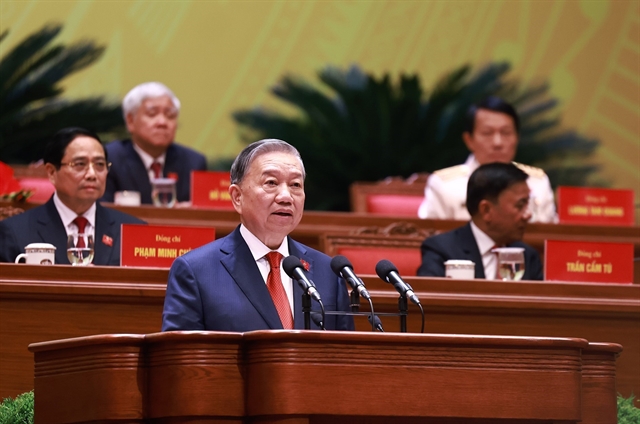 Society
Society

Reducing the gender gap in the areas of politics and labor force participation was among the top issues at the on-going session of the 14th National Assembly (NA) deputies yesterday, during the broader discussion of the national target on gender equality.
 |
| Women in the northern province of Nam Định collect oysters harvested on a fishing ship. The National Assembly calls for gender equality in politics and the labour force, aiming to create favourable conditions for women in different fields. — VNA/VNS Photo Lâm Khánh |
HÀ NỘI — Reducing the gender gap in the areas of politics and labour force participation was among the top issues at the on-going session of the 14th National Assembly (NA) meeting on Thursday, during the broader discussion of the national target on gender equality.
According to the Government report, efforts by ministries, sectors and localities to enhance gender equality have achieved encouraging results. Policies and legal regulations on the issue have been gradually completed, creating more favourable conditions for women in various fields.
However, the implementation in some localities and agencies remains ineffective and has fallen short of targets.
Regarding gender equality in the field of politics, many deputies said not enough attention has been paid to improving the rate of women’s participation in administration bodies.
Deputy Nguyễn Thị Thu Hà from the northern province of Bắc Giang said the women have had lower odds of success than men in the 14th NA election. The percentage of women in the 14th NA is 39.2 per cent while that figure for men is 68.4 per cent.
Deputy Phan Văn Tường from the northern province of Thái Nguyên proposed the NA spend more time discussing the implementation of gender equality policies. NA deputies also raised concerns about gender inequality in the field of labour and employment. They stressed that the employment quality of female workers remains unstable and they often work in the low-skilled fields.
Deputy Trương Thị Bích Hạnh from the southern province of Bình Dương said 70 per cent of female labourers work in the fields of services, garments and textiles, and footwear.
The rate at which women receiving training is lower than that of men, while the unemployment rate among women is higher than that of men, she said. The average income of a paid female worker is 10.7 per cent lower than that of men.
Some deputies also mentioned the sacking of female workers over 35 years old at a number of enterprises that have received foreign direct investment.
Deputies also discussed other issues relating to the national target on gender equality, including retirement age and retirement pension, violence against women and girls, the trafficking of women and children, and gender imbalance at birth.
Closing the discussion, Deputy NA Chairwoman Tòng Thị Phóng said the NA asked the Government to complete related legal documents on gender equality and incorporate gender equality in socio-economic development plans.
Attention should also be paid to human resources training and development, raising public awareness of gender equality and increasing supervision over the implementation of gender equality, she said.
Based on the Government report and opinions of NA deputies, the NA would guide the Ministry of Labour, Invalids and Social Affairs to study and seriously implement measures to fulfill gender equality goals in the future.
Anti-corruption measures
Inspector General Lê Minh Khái from the Government Inspectorate presented to the NA a draft Law on Prevention and Combating Corruption in the National Assembly’s afternoon session on Thursday.
Khái said that corruption in the country is becoming more common and more complex, despite some achievements under the country’s 2005 anti-corruption law.
Largely for-show asset disclosure forms, extremely low asset recovery – a 10-year report on the anti-corruption law by the Government revealed only 7.82 per cent of the value stolen by corruption were recovered—and Government agencies’ failure to monitor the flow of assets and income of officials and public servants are among the shortcomings.
Commenting on the country’s draft anti-corruption law, chairwoman of the NA Judicial Committee Lê Thị Nga stressed the importance of giving Government agencies charged with supervising public servants’ assets and revenue the power to provide law enforcement with evidence and information as well as to take actions to stop them from moving their illegal gains.
Nga said, however, the law must also consider individuals’ rights to privacy, which are granted in the Constitution. She said a legal framework and procedures are needed to ensure such rights are also protected.
Deputies suggested that Government officials and public servants must disclose their assets with their offices where they are currently working and they must be required to continue to do so for at least five years after their retirement.
“In many instances, they acquired numerous valuable assets right after their retirement,” said deputy Ngọ Duy Hiểu from Hà Nội.
Deputies urged asset disclosure to be made mandatory for both Government officials and public servants as a cornerstone of the country’s efforts to halt rampant corruption.
Deputy Nguyễn Phước Lộc from HCM City said corruption is widespread among public servants in certain areas, even if they do not hold high-ranking posts within the Government.
“These types of petty corruption crimes constantly annoy and frustrate the people,” Lộc said.
Deputy Sùng Thìn Cò from the northern province of Hà Giang said the law severely punishes those who commit treason or engage in espisonage activities against the country’s interest and in his view, corruption is just as dangerous to the country because it damages the trust the people put in their Government.
“Public servants are the foundation of our Government. Good public servants can help the country and the people, just as bad ones will cause a lot of damage. We must fight corruption as if it’s an enemy from within,” he said. — VNS




